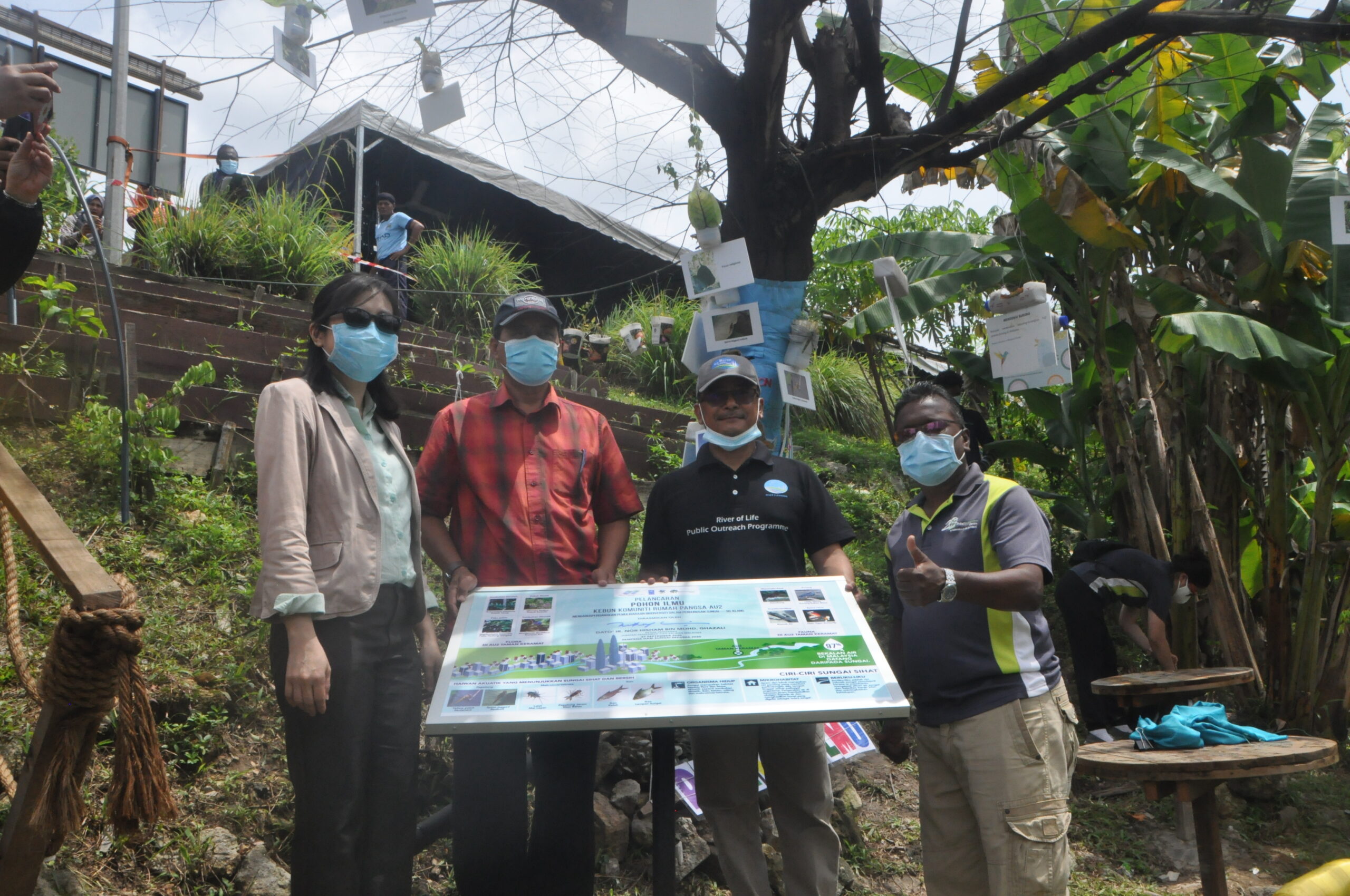Kuala Lumpur, 12 October 2020 – About 150 urbanites residing in the Klang Valley were treated to half-day river educational activities happened concurrently at 150 m stretch of Klang River next to the AU2 Urban Community Garden. The highlight of the event saw Dato Ir. Mohd Azmi Ismail, Deputy Director-General 1 (Business Sector), DID Malaysia launching the Pokok Ilmu under the Mainstreaming of Biodiversity Conservation into River Management Project implemented by Department of Irrigation and Drainage (DID), supported by UNDP and funded by Global Environment Facility (GEF) and Global Environment Centre (GEC) as the implementing partner.
The project aims to promote conservation of riverine biodiversity through the development of strategies and promotion of best management practices and capacity building for key stakeholders, which includes the public and local communities. In conjunction with the World Rivers Day today, the event is organised as part of wider efforts to raise public awareness on the importance of incorporating biodiversity conservation into riverine landscape management in Malaysia through best management practices.
The event is organised by Department of Irrigation and Drainage (DID) Malaysia in partnership with the Global Environment Centre (GEC) and Komuniti Rumah Pangsa AU2, supported by Department of Fishery (DOF) Malaysia, Department of Agriculture (DOA) Malaysia, Majlis Perbandaran Ampang Jaya (MPAJ) and Lembaga Urus Air Selangor (LUAS) under the Mainstreaming Biodiversity into River Management project.
One of the activities that took place prior to the launching ceremony was, know your local species, an educational competition that required participants to only catch invasive fish river species and removal of invasive plant species along the riverbanks. As part of best management practices, participants are taught on the importance and to identify local fish species by the DOF Malaysia and replant local riverine plant species along the Klang river supported by DOA Malaysia.
“Alien fish species can now be found everywhere in our rivers and lakes. Tilapia and Ikan Bandaraya are among the common species found plethoric in Sungai Klang. Their aggressive characteristics threaten the livelihood of our local fish species such as Patin, Haruan, Kalui, Lampan, Puyu and Sepat, as well as damaging our ecosystem of lakes and rivers.
One of the main reason for the presence of these alien species in our waterways is from trade in alien species for aquarium use. Once fish hobbyists have outgrown their fetish, or find their fish to be unmanageable when big, they are then released into our lakes and rivers. For example, Ikan Bandaraya is often kept in aquariums because they eat algae and help to keep the water clean. But, when released into nature the fish eat juvenile fish of other species,” said Dato Ir. Mohd Azmi Ismail, Deputy Director-General 1 (Business Sector), DID Malaysia.

Tuan Haji Md Khairi Selamat, Director of River Basin Management Division of DID Malaysia added, “the project in Selangor and KL is an initiative by the River Basin Management Division of DID Malaysia with Selangor State and Federal Territory KL of DID and GEC to add value to the ongoing project of River of Life, particularly the public outreach programme. The project also aims to establish three pilot and demonstration sites within the Klang River Basin at upstream of Klang River in Kampung Taman Warisan, midstream of Klang River in AU2 and Gombak River in Sentul to promote the integration of riverine biodiversity conservation with community participation into river management. Besides championing the Klang River basin in Selangor and KL, the project also stretches to Perak and Sabah championing the Sungai Kinta and Sungai Segama respectively.”
“Our country approach to river conservation and management mostly focuses on structural measures for pollution and flood control. There is little consideration for riverine biodiversity and habitat management. Without ecological restoration or biodiversity restoration, a river cannot continue to meet the needs of our society or the need for living things. Hence, mainstreaming biodiversity conservation into river management is imperative in ensuring our rivers are healthy. By identifying riverine biodiversity is the best way to understand and control our impact on the rivers. For instance, having too many invasive fish species in the Klang River is not a healthy indicator and it degrades the river. Hence, organising environment awareness event such as today allows the public to be aware of our rivers’ conditions and empower them to protect our native biodiversity and prevent river degradation,” said Dr K. Kalithasan, GEC’s River Care Programme Manager and river management expert who is also spearheading the ecological restoration of the project.
Other activities organised are religious talk on river management by Ustaz Dr. Nurul Haq Shahir and Young River Scientist Programme. The religious talk becomes the choice of participants who are unable to partake in physical activity. Meanwhile, young river scientist programme becomes the choice of many parents to expose their children about the importance of rivers through the fun-learning outdoor classroom. Children aged 5 to 12 years were engaged with interesting mini-experiments to measure good and bad river water and had fun in playing environmental-themed games such as fishing for litter and jigsaw puzzle.
This year’s fun-filled World Rivers Day in Selangor has brought together the urban dwellers to a common understanding of how they can work together to protect and conserve the Klang River. The World Rivers Day is celebrated every year on the fourth Sunday of September. Begun in 1989 in British Columbia, Canada; World Rivers Day is a day to raise public awareness and promote the preservation and conservation of rivers around the world.







